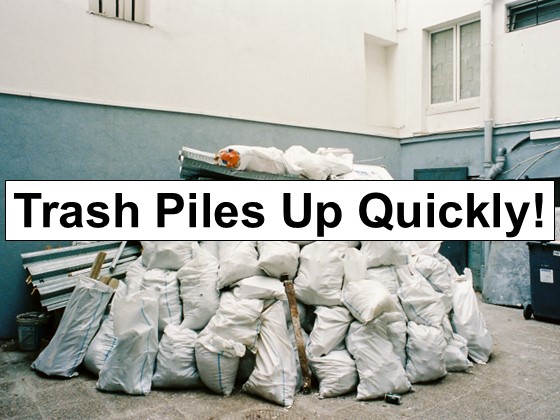We had a brief dusting of snow over Thanksgiving. It was a small annoyance as most weather-related events are around here, but what was most annoying was our trash service failing to pick up our trash and recycling bins. It’s inevitable that whenever there’s the slightest hint of road trouble that they refuse to pick up our trash. And, of course, our trash bins are piled high around the holidays.
I, despite already knowing the answer, requested a missed pickup. Their answer was that they got my request and that they would simply come the following week on their normally scheduled day. That’s not living up to their end of the contract, which in my opinion, should reduce my payment, but they had no problem charging me my normal rate, let alone increasing my payment amount by a dollar or two each billing cycle. That doesn’t feel entirely fair.
Getting off my rant, which has nothing to do with preparedness, I got to thinking about trash from a prepping perspective again. That is, what would we do once we realized that the trash and recycling wouldn’t be picked up for some time?
If it’s a short-term scenario of only a week or two, I wouldn’t change much aside from doing a better job of separating what’s really trash from recycling going forward. The bigger problem would be what to do with all of the trash that’s already been bagged and set out for collection.
If it’s winter, I would probably just double-bag what I already had collected into 30-gallon or larger trash bags to keep the smells contained. I might also move it all into the garage where animals (both mine and woodland creates) can’t get into it. In the winter, this would would out fine because everything should stay relatively cold, but the summertime could be problematic. In this case, I’d probably still just leave it all bagged assuming they’ll come to collect it all soon. After all, who wants to dig through their gross, smelly trash?
If we assumed there it was a longer-term problem, I would certainly opt to compost every bit of compostable material, which wouldn’t leave much actual trash. This assumes everything else stops, such as grocery store hauls and Amazon deliveries.
There would still be some recycling, such as empty cans of food and used boxes of supplies (both food and non-food items), but even that would be manageable. Of course, I would have to consider where it will all go for weeks or months on end. The recycling would just pile up in the garage somewhere. Maybe I would empty some bins of other items we don’t need truly contained, like a ton of Christmas decorations, and use those to contain it all. The problem, however, is that used cans of food wouldn’t be rinsed out like they normally are–because of water conservation efforts–which means there will be food residue that could attract pests and insects. So, the bins would need lids for sure. Such problems would be compounded in the summer heat. In this case, I might actually choose to pile it all in the yard somewhere … that’s to be determined.
As for the trash, I guess it depends on what we’re actually throwing away. If we compost or, at least, bury everything that will decompose relatively quickly, and we properly contain recycling, and if there isn’t anything else coming into the house, then my assumption is there won’t be much left. Thus, I would simply double-bag it all in large contract-style garbage bags and store them in the third-car garage where animals can’t get to it. If worse came to worst, then I would start digging holes and bury what I can, but that’s difficult in the winter and seems like a waste of my efforts.
All that said, I’m fortunate to have the space and some land, which gives me options. For those in suburbia, you could probably do the same but you’d want to be even more proactive and maybe get creative with how and where you stash your trash and recycling. That said, I’m sure a little creativity will see you through. But, if you want to be truly proactive, then consider purchasing a few large trash cans (even plastic ones will suffice) with lids and nest them together. Stack the cans out of the way and be sure to bag everything. Or you could just toss it all out in the backyard and let the critters figure it out.
If you live in an apartment or a city, then you’ve got real problems. When we were in Boston (and New York and elsewhere) two months ago, I’d wondered where all the trash went each day given how packed together everything (and everyone) was. Apparently, they pick it up each and every night. Imagine just how problematic this will all be if that doesn’t happen regularly! I’m sure there have been times when trash didn’t get taken away, but it will become a real mess relatively quickly. Thus, you’re going to have to manage your own trash.
I recommend either reaching out to your neighbors as quickly as possible after an event and coming to a collective agreement on what to do with everything or hunkering down and, for lack of a better term, hoarding your own trash. But this largely depends on how well your trust your neighbors, how prepared they might be, and how long you expect the disaster to continue. I don’t like either plan, but you’ve got to do something or things will literally pile up and bring about all manner of disease and unpleasantness.
Ultimately, you need to make a plan now while things are good. Trash isn’t something we, as preppers, want to consider, but it is something that we, as preppers, will plan for because we’re not the sheeple. We don’t stick our heads in the proverbial trash pile and pretend it doesn’t exist.
Thoughts?

Leave a Reply